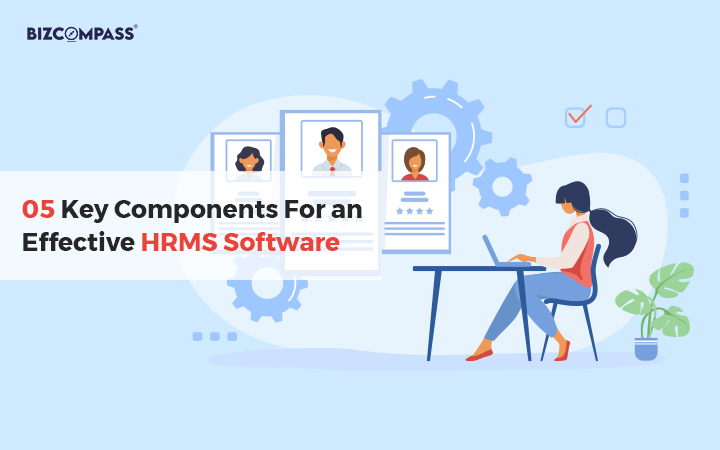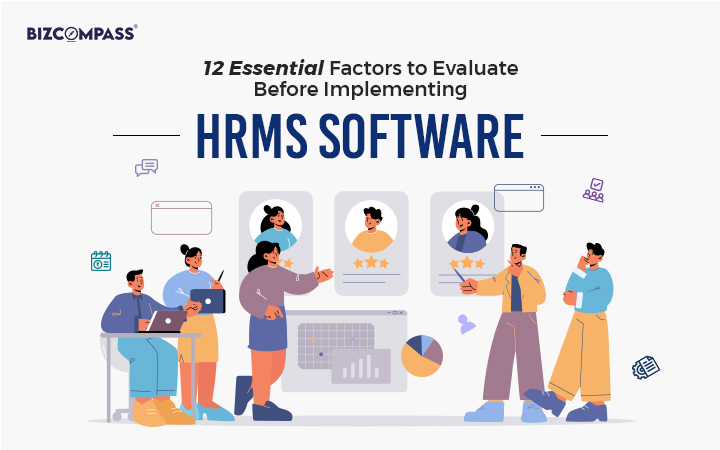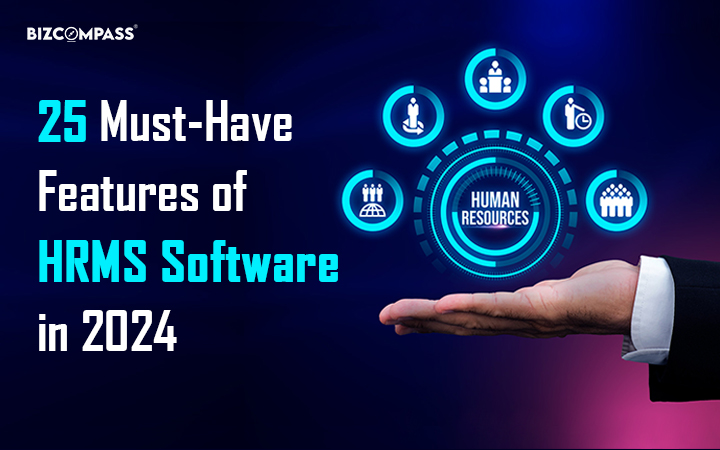Content
- Introduction
- The Rise Of Artificial Intelligence (AI) In HRMS
- Enhanced Data Analytics And Predictive Insights
- Employee Experience And Engagement
- Remote Workforce Management
- Automation Of Administrative Tasks
- Mobile-Friendly HRMS Solutions
- Employee Self-Service Portals
- Integration Of Learning Management Systems (LMS)
- Compliance And Security In HRMS
- The Emergence Of HR Analytics
- Conclusion
- Faq
Introduction
In the rapidly evolving realm of Human Resource Management Systems (HRMS), staying abreast of emerging trends is paramount for organizational success.
As we approach 2024, the HR landscape continues its transformative journey, influenced by technological advancements, changing work dynamics, and evolving employee expectations.
Our latest blog delves into the top 9 HRMS trends that are set to redefine the way businesses manage their workforce in the coming year. From the integration of artificial intelligence and machine learning to enhance decision-making processes to the prioritization of employee well-being through advanced analytics, this insightful exploration navigates the future of HRMS.
Discover how organizations are leveraging innovative technologies to streamline recruitment, improve employee engagement, and foster a more agile and resilient workplace.
Join us on this exploration of the key trends shaping HRMS in 2024 and gain valuable insights to propel your organization toward greater efficiency and employee satisfaction.
The Rise Of Artificial Intelligence (AI) In HRMS
The ascent of Artificial Intelligence within Human Resource Management Systems marks a revolutionary shift in the way organizations approach talent acquisition and employee engagement.
In the realm of recruitment, AI is becoming the cornerstone, streamlining processes, and enhancing decision-making with predictive analytics. Its ability to analyze vast datasets accelerates candidate matching and selection, ensuring a more efficient and effective hiring process.
Moreover, AI's influence extends to employee engagement and retention strategies, where personalized insights gleaned from data analytics foster a deeper understanding of individual needs and preferences.
By harnessing AI capabilities, HRMS platforms are not only automating routine tasks but also proactively shaping a workplace culture that resonates with each employee, ultimately contributing to higher satisfaction, productivity, and retention rates. As we delve into 2024, the integration of AI into HRMS is poised to redefine the HR landscape, promising a more intelligent approach to workforce management.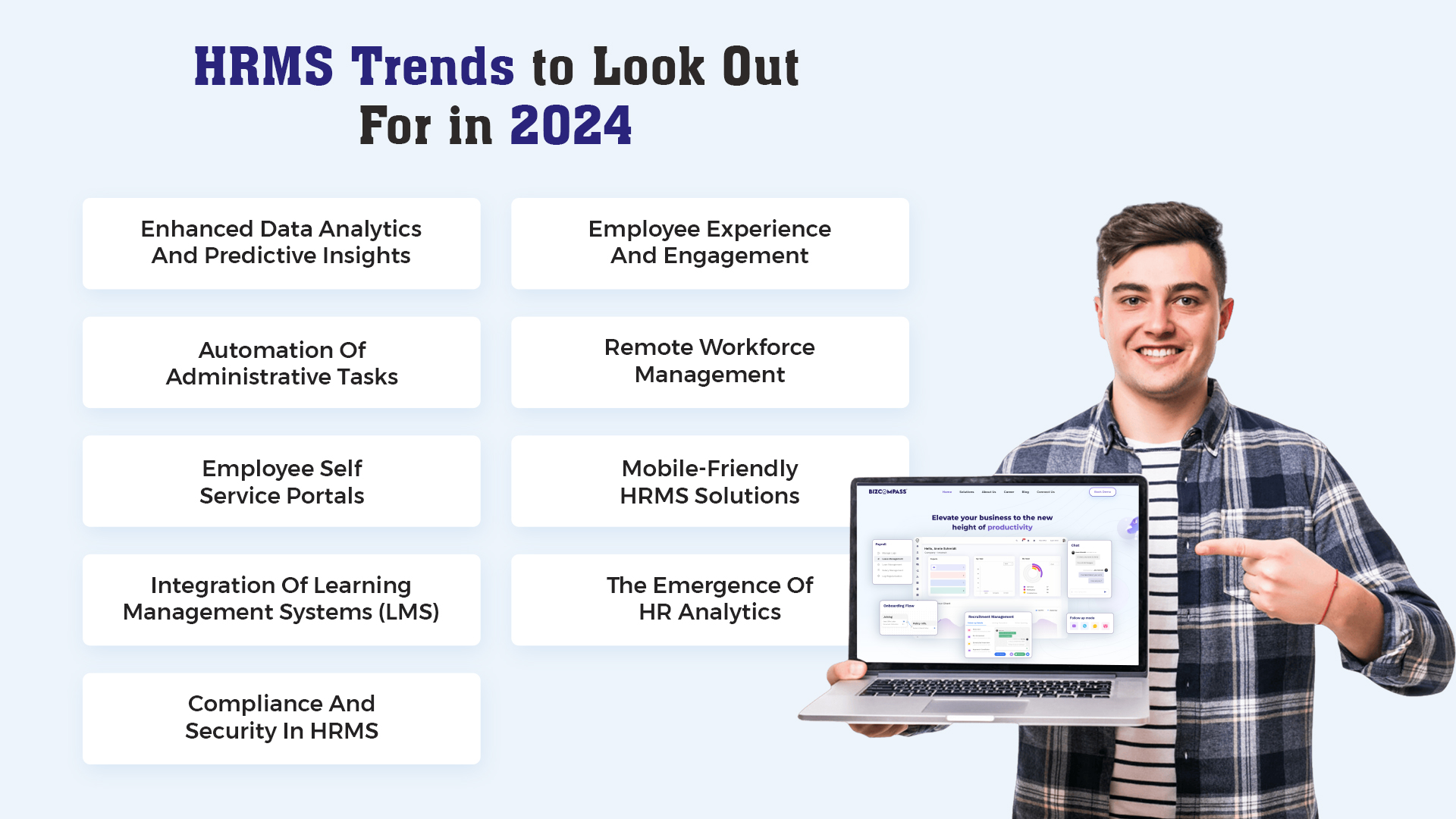
Enhanced Data Analytics And Predictive Insights
Harnessing the power of big data, organizations are poised to make intelligent decisions that transcend traditional HR practices. By analyzing vast datasets, HRMS platforms provide a comprehensive understanding of workforce dynamics, enabling strategic planning and informed decision-making.
One of the key drivers of this transformation is the integration of predictive analytics, which goes beyond historical data to anticipate future trends. This predictive power streamlines HR operations, from talent acquisition to employee development, fostering a more agile and proactive approach.
As we navigate the intricacies of 2024, the synergy between enhanced data analytics and predictive insights is set to redefine HRMS functionalities, empowering organizations to not only respond to current needs but also anticipate and shape the future of their workforce.
Employee Experience And Engagement
HRMS platforms are now instrumental in crafting personalized employee experiences and tailoring interactions and processes to individual needs. This heightened personalization not only enhances job satisfaction but also contributes to overall employee well-being and productivity. A notable trend in fostering engagement is the incorporation of gamification within HRMS.
By integrating game-like elements into workplace activities and processes, organizations are creating an interactive and dynamic environment. Gamification not only adds an element of fun to mundane tasks but also serves as a motivational tool, driving employee participation and performance.
As we step into 2024, the amalgamation of personalized experiences and gamification within HRMS is reshaping the employee-employer relationship, ushering in an era where technology plays a pivotal role in enhancing satisfaction, fostering engagement, and ultimately contributing to a vibrant workplace.
Remote Workforce Management
Remote Workforce Management emerges as a pivotal focus within Human Resource Management Systems, addressing the evolving dynamics of the modern workplace. With a significant shift towards remote and hybrid work models, HRMS platforms are adapting to ensure seamless collaboration and efficient management of dispersed teams. These systems now play a crucial role in facilitating remote work, offering tools and features that prioritize connectivity and communication.
Integration of collaboration tools within HRMS enables remote teams to collaborate effectively, fostering a sense of unity and productivity despite physical distances. From virtual meetings to project handling, HRMS is becoming the backbone of remote workforce management, providing organizations with the agility and adaptability needed to thrive in the changing work landscape.
Automation Of Administrative Tasks
HRMS platforms are increasingly incorporating automation to streamline administrative tasks, reducing manual workloads and enhancing overall productivity. From automating routine paperwork to expediting onboarding processes, this shift allows HR professionals to focus on strategic initiatives rather than repetitive administrative duties. A notable facet of this trend is the integration of chatbots within HRMS, providing efficient and instant support to employees.
These intelligent bots assist with inquiries, guide employees through processes, and ensure a swift resolution of common HR-related queries. As we navigate the intricate landscape of 2024, the automation of administrative tasks within HRMS is not merely a technological upgrade but a strategic move toward optimizing resources and elevating the effectiveness of human resource management.
Mobile-Friendly HRMS Solutions
The surge in Mobile-friendly HRMS Solutions signifies a transformative leap in Human Resource Management Systems, adapting to the mobile-centric nature of the modern workforce. In 2024, HRMS platforms prioritize accessibility through dedicated mobile apps, empowering users to manage HR-related tasks anytime, anywhere. These mobile solutions offer access to HRMS features, providing a user-friendly interface that facilitates remote collaboration and empowers employees on the go.
Whether it's submitting leave requests, accessing performance reviews, or staying updated on company communications, the mobile-friendly HRMS paradigm ensures that critical HR functions are at the fingertips of users. In an era where flexibility and remote work are paramount, the integration of mobile apps into HRMS not only caters to the needs of a mobile workforce but also enhances overall user engagement, fostering a more connected and agile workplace.
Employee Self-Service Portals
Employee Self-Service Portals redefine the HR landscape by putting empowerment directly into the hands of employees. In 2024, Human Resource Management Systems prioritize these portals, offering a user-friendly interface for employees to manage various aspects of their work-life independently.
From requesting leaves and accessing benefits information to updating personal details, these portals streamline administrative tasks, saving time for both employees and HR professionals.
By providing a centralized platform for self-service options, HRMS contributes to a more efficient and transparent workplace. Employees gain autonomy over their HR-related needs, fostering a sense of control and satisfaction. As organizations embrace the paradigm of employee-centric HRMS, the emphasis on self-service portals reflects a commitment to enhancing the overall employee experience and facilitating a smoother, more agile approach to workforce management.
Integration Of Learning Management Systems (LMS)
The Integration of Learning Management Systems marks a strategic evolution within Human Resource Management Systems, heralding a harmonious relationship between HR and employee development.
In 2024, organizations are increasingly adopting HRMS solutions that seamlessly integrate with LMS, creating a unified platform for comprehensive talent management.
This integration facilitates a more fluid and effective approach to employee development, bridging the gap between HR initiatives and personalized learning journeys.
HRMS now empowers organizations to tailor learning experiences, track progress, and align training programs with individual career paths. As a result, employees benefit from targeted development opportunities that align with their goals and contribute to overall skill enhancement. In the dynamic landscape of workforce management, the integration of LMS into HRMS signifies a commitment to continuous learning and development, fostering a more skilled, engaged, and adaptable workforce.
Compliance And Security In HRMS
In the ever-evolving landscape of Human Resource Management Systems, the focus on Compliance and Security takes center stage. As organizations navigate the complexities of data management, HRMS is increasingly prioritizing robust measures to ensure data privacy and protection.
In 2024, HRMS solutions will be designed with stringent compliance frameworks, aligning with regulatory standards to safeguard sensitive employee information. These systems employ advanced encryption, access controls, and secure authentication protocols, bolstering defenses against potential cyber threats.
Compliance features within HRMS not only mitigate legal risks but also instill confidence among employees regarding the responsible handling of their personal data. As data breaches become more sophisticated, the commitment to compliance and security within HRMS reflects a dedication to maintaining the trust of both employees and regulatory authorities. In an era where data protection is paramount, HRMS emerges as a guardian, ensuring the confidentiality of sensitive HR information.
The Emergence Of HR Analytics
By utilizing advanced analytics tools, HRMS platforms empower decision-makers to glean insights from vast datasets, offering a nuanced understanding of employee behavior, engagement, and productivity.
This data-driven approach extends beyond traditional HR functions, influencing strategic initiatives such as talent acquisition, retention, and workforce planning. In the evolving landscape of HR, the incorporation of HR analytics within HRMS is not merely a tech upgrade but a strategic imperative.
It enables organizations to make informed decisions, optimize processes, and align HR strategies with broader business objectives. As the influence of HR analytics continues to grow, HRMS emerges as a key driver in navigating the complexities of the modern workforce.
Conclusion
As we anticipate the trajectory of Human Resource Management Systems (HRMS) in 2024, it is evident that a wave of transformative trends is reshaping the landscape of workforce management.
From the rise of Artificial Intelligence driving talent acquisition to the seamless integration of Learning Management Systems fostering employee development, the journey ahead is marked by innovation.
The mobile-friendly approach, emphasis on employee self-service portals, and the pivotal role of HR analytics underscore a commitment to enhance the employee experience and optimize the HR process.
Compliance and security take center stage, ensuring data protection in an era of heightened privacy concerns. The confluence of these top 9 HRMS trends not only streamlines administrative tasks but also positions HR as a strategic partner, driving informed decisions and fostering a dynamic, resilient, and empowered workforce for the challenges of the future.
FAQ
How is AI influencing HRMS in 2024?
AI is significantly impacting HRMS by revolutionizing talent acquisition through predictive analytics. It is also being leveraged for employee engagement and retention, contributing to more data-driven and effective HR strategies.
What role do mobile-friendly solutions play in HRMS trends?
Mobile-friendly HRMS solutions are essential for providing accessibility to HR features on the go. In 2024, dedicated mobile apps ensure that employees can manage tasks and access information conveniently, contributing to a more connected and agile workforce.
How are Learning Management Systems (LMS) integrated into HRMS?
The integration of LMS into HRMS is a growing trend, allowing organizations to create personalized learning journeys for employees. This integration streamlines employee development, aligning training programs with individual career paths.
What is the significance of Employee Self-Service Portals in HRMS?
Employee Self-Service Portals empower individuals by allowing them to manage various aspects of their work life independently. These portals streamline administrative tasks such as leave requests, benefits access, and personal information updates.
How does HRMS address the challenges of remote workforce management?
HRMS addresses remote workforce management challenges by offering tools and features that facilitate collaboration and communication among dispersed teams. This includes features like virtual meetings and project management capabilities.
Why is Compliance and Security crucial in HRMS?
Compliance and Security are paramount in HRMS to ensure data privacy and protection. In 2024, HRMS solutions adhere to regulatory standards, employing encryption and access controls to safeguard sensitive employee information.
How does HR analytics contribute to HRMS trends in 2024?
HR analytics is emerging as a key trend in HRMS, driving strategic decisions by measuring HR performance and identifying trends within the workforce. It empowers organizations to make informed decisions and align HR strategies with broader business objectives.
What is the role of gamification in employee engagement within HRMS?
Gamification is employed within HRMS to drive employee engagement by incorporating game-like elements into workplace activities. This not only adds an element of fun to tasks but also serves as a motivational tool, enhancing participation and performance.
How does HRMS contribute to enhanced employee experiences?
HRMS contributes to enhanced employee experiences by providing personalized interactions and experiences through features like mobile apps, self-service portals, and tailored learning journeys. This focus on personalization fosters job satisfaction and overall well-being.
What can organizations expect from the integration of HRMS trends in 2024?
The integration of these HRMS trends in 2024 signifies a strategic shift toward more efficient, data-driven, and employee-centric HR practices. Organizations can expect streamlined processes, improved decision-making, and a workplace that adapts to the dynamic needs of the modern workforce.

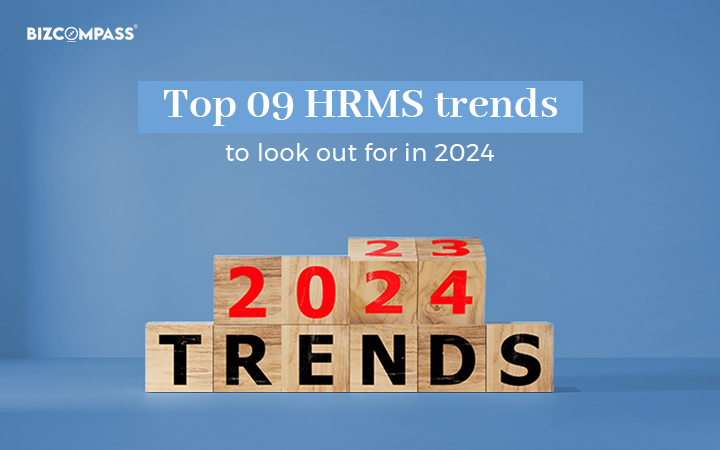
 >
>
